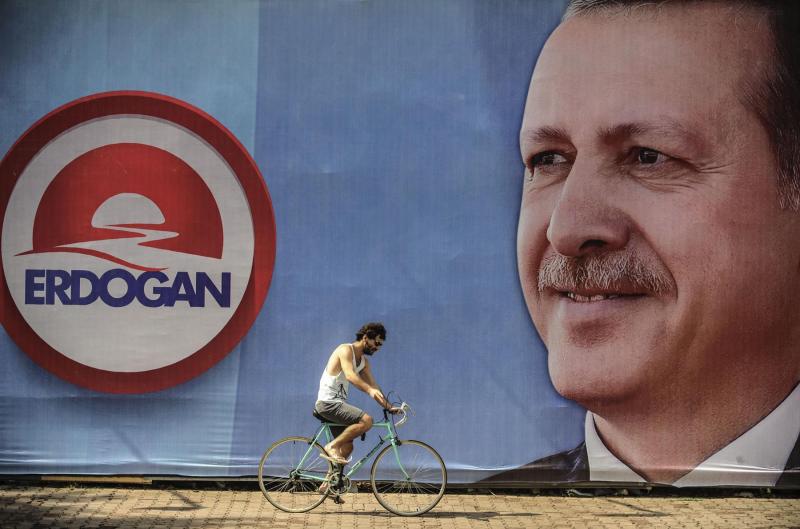Between a rock and a hard place. A Turkish man rides a bicycle past a poster of Turkish President Recep Tayyip Erdogan in Istanbul. (AFP)
Regardless of the outcome of Turkey’s local elections March 31, a crucial question will persist.
Will the new regime, with its super-presidential system, consolidate itself as the last representative of Ikhwanism, a term derived from the Arabic word for the Muslim Brotherhood, or will it metamorphose into a Turkish blend of Ba’athism and Islamism?
It’s clear that sections loyal to Turkish President Recep Tayyip Erdogan within the security apparatus, as well as political appointees to official posts, identify with the Muslim Brotherhood. Discourse in the pro-government media confirms this.
These circles believe in an Ikhwanist strategy for the long term despite setbacks in Turkey’s southern neighbourhood. A mukhabarat mechanism has become dominant in the administration. Centralised in the presidential palace in Ankara, the mukhabarat’s existence is synced with Erdogan’s political survival.
However, it’s not as simple as that. Since 2014, Erdogan has relentlessly engineered the political mechanisms by replacing Gulenists and pro-Western bureaucrats in key institutions with members of Islamist sects, such as Menzil, as well as ultranationalist or pro-Russia elements.
Erdogan can’t be said to have taken full control of the judiciary or even of the military, even though the purge after the botched 2016 coup continues in a patchy fashion almost daily.
The context makes the upcoming local elections less important than might have been thought. The elections bring down the curtain on one act of an open-ended power play.
Turkey is more complex than Libya, Syria or Egypt. It has defied disruption. The 2016 incident was not so much an attempted coup than a failed military uprising but Turkey seems far from plunging into civil war, as did Libya and Syria.
That said, Turkey faces a crisis in terms of tensions between Islamists and secular militarists. Something will surely happen to resolve it and one camp will triumph. If so, it will be the final battle over who controls the presidential system.
No matter who grabs power, the super-presidency will be useful to rule the country with an iron fist.
Gokhan Bacik, a political scientist and expert on Turkish politics, said the regime enshrines “competitive authoritarianism.” “(It) tends to a stalemate,” he said. “The regime is unable to move to full authoritarianism, while the opposition is unable to bring about a return to full democracy.”
Let’s go back to the real question: Where are we with respect to Erdogan’s magnificent ambition of supremacy over the Sunni world?
Hidden ambitions are built on the annihilation of democratic order and rule of law. They are built on impunity and lack of accountability. The system has been restructured by means of unlawful acts, which caused rage at home and deep mistrust abroad. A system that works towards the unity of powers minimises the role of the ballot box.
Democracy is dead in Turkey and so is rule of law. Erdogan’s magnificent ambition is about to terminate Turkey’s strategic partnership with the United States. The European Union is on the point of suspending the accession process for membership of the bloc. Erdogan’s hands are tied because the Russian leadership has less confidence in his Ikhwanist sympathies than he thinks.
The Syrian regime’s rise from the ashes and the United States’ hostility to Iran will not be helpful in achieving Erdogan’s dream.
Having burned bridges with reformists and Kurds at home, Erdogan will be unable to return even to a minimal democratic order. Such a course-reversal would make him accountable and dispensable. Should he choose to go it alone, it will be an extremely high-stakes game. He will constantly need domestic allies.
There is, of course, the option of metamorphosis. Keeping China close and Russia even closer, Erdogan will feel the need to share power with his militarist, anti-Western foes at home by means of another grand bargain, if necessary.
This points to a merger of Ba’athism (a rough form of Kemalism) and Islamism. It would be a tense coalition, doomed to implosion and dependent on the magnitude of the systemic and economic crisis that faces Turkey.
Erdogan has time to calculate the risks but his journey so far tells us he will never loosen his grip on the tools that keep him in power.




